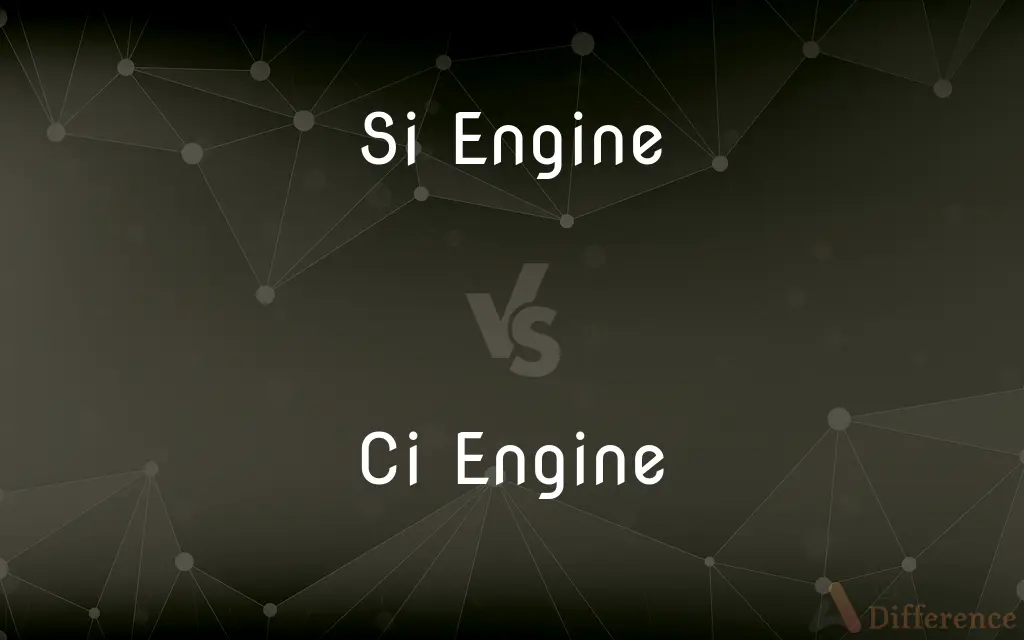Si Engine vs. Ci Engine — What's the Difference?
Edited by Tayyaba Rehman — By Fiza Rafique — Published on December 17, 2023
Si Engine (Spark Ignition) uses a spark plug to ignite the fuel-air mixture, while Ci Engine (Compression Ignition) ignites fuel by compressing air until it heats.

Difference Between Si Engine and Ci Engine
Table of Contents
ADVERTISEMENT
Key Differences
In the world of internal combustion engines, Si Engine and Ci Engine are two distinct categories. The Si Engine, or Spark Ignition engine, relies on a spark plug to ignite the fuel-air mixture. This spark, which is controlled electronically, ensures that combustion takes place at the right moment. On the other hand, the Ci Engine, or Compression Ignition engine, does not use a spark plug. Instead, it compresses the air inside the cylinder to such a degree that the air heats up. When diesel fuel is then injected into this hot, compressed air, it spontaneously ignites.
Both Si Engine and Ci Engine have their own set of advantages and applications. Si Engines, due to their spark plug mechanism, typically use gasoline as fuel. They are commonly found in passenger vehicles and small machinery because of their quiet operation and smooth acceleration. Conversely, Ci Engines usually use diesel as their fuel. The absence of spark plugs and the use of compression for ignition make them more fuel-efficient in some cases.
However, there are also drawbacks to each. Si Engines can be less fuel efficient than Ci Engines, and they require a more intricate electrical system because of the need for spark plugs and related components. In contrast, Ci Engines tend to be heavier, louder, and emit more nitrogen oxides and particulates, which can be environmentally concerning.
In summary, Si Engine and Ci Engine represent two different mechanisms for igniting fuel in an internal combustion engine. While the Si Engine uses a spark plug and typically runs on gasoline, the Ci Engine relies on compression and usually utilizes diesel.
Comparison Chart
Ignition Mechanism
Uses spark plug for ignition
Relies on air compression
ADVERTISEMENT
Common Fuel Type
Gasoline
Diesel
Efficiency
Generally less efficient
Often more fuel efficient
Noise Level
Quieter operation
Louder due to compression ignition
Environmental
Emits less NOx and particulates
Emits more NOx and particulates
Compare with Definitions
Si Engine
The operation of an Si Engine depends on a precise electrical system for timely ignition.
Regular maintenance of the Si Engine's spark plugs ensures optimal performance.
Ci Engine
In a Ci Engine, the air is compressed to a point where injected fuel spontaneously ignites.
The Ci Engine in industrial machinery offers high torque at low speeds.
Si Engine
Si Engine is a type of internal combustion engine that ignites fuel using a spark plug.
Most passenger cars utilize an Si Engine for smoother acceleration.
Ci Engine
Due to the absence of spark plugs, Ci Engines rely solely on the compression of air for ignition.
The tractors in the farm run on Ci Engines for robust performance.
Si Engine
An Si Engine functions by mixing fuel and air, then igniting it with an electrical spark.
The Si Engine in my car provides quick response and easy start-up.
Ci Engine
Ci Engine is an internal combustion engine where ignition occurs due to compressed hot air.
Big trucks predominantly use Ci Engines because of their durability.
Si Engine
Si Engines are commonly associated with gasoline-powered vehicles.
Motorcycles primarily use the Si Engine mechanism for propulsion.
Ci Engine
Ci Engines are synonymous with diesel engines, given their use of diesel fuel.
Marine vessels often employ Ci Engines due to their fuel efficiency.
Si Engine
Si Engines are preferred in applications where noise reduction and smoothness are crucial.
Luxury sedans often feature Si Engines to enhance passenger comfort.
Ci Engine
Ci Engines are often chosen for applications demanding high fuel efficiency and durability.
Many generators have Ci Engines to ensure longer operational hours.
Common Curiosities
Are Ci Engines generally louder than Si Engines?
Yes, Ci Engines are usually louder due to their compression ignition mechanism.
How does a Ci Engine ignite its fuel?
Ci Engine ignites fuel through the compression of air.
Why are Si Engines commonly found in passenger cars?
Si Engines offer smoother acceleration and quieter operation, preferred for passenger comfort.
What does Si in Si Engine stand for?
Si stands for Spark Ignition.
Which engine type, Si Engine or Ci Engine, is more fuel-efficient?
Ci Engines are often more fuel-efficient than Si Engines.
Can an Si Engine run on diesel?
Typically, Si Engines are designed for gasoline, while Ci Engines are designed for diesel.
What does Ci in Ci Engine denote?
Ci represents Compression Ignition.
Which engine type, Si or Ci, is more environmentally friendly?
Si Engines generally emit fewer nitrogen oxides and particulates than Ci Engines.
Are Ci Engines typically heavier than Si Engines?
Yes, Ci Engines are often heavier due to their robust construction.
Which fuel is typically used in Si Engines?
Gasoline is the primary fuel for Si Engines.
Why might one choose an Si Engine over a Ci Engine?
Si Engines offer quieter operation, smoother acceleration, and are better suited for light-duty applications.
Do Ci Engines require spark plugs?
No, Ci Engines don't use spark plugs; they rely on air compression for ignition.
Are Ci Engines considered more robust and durable?
Yes, Ci Engines are often chosen for applications demanding durability.
What's the primary component responsible for ignition in Si Engines?
The spark plug is responsible for ignition in Si Engines.
Can Ci Engines operate at higher compression ratios than Si Engines?
Yes, Ci Engines often operate at higher compression ratios, leading to their fuel efficiency.
Share Your Discovery

Previous Comparison
Maternal Twins vs. Paternal Twins
Next Comparison
Summer Olympics vs. Winter OlympicsAuthor Spotlight
Written by
Fiza RafiqueFiza Rafique is a skilled content writer at AskDifference.com, where she meticulously refines and enhances written pieces. Drawing from her vast editorial expertise, Fiza ensures clarity, accuracy, and precision in every article. Passionate about language, she continually seeks to elevate the quality of content for readers worldwide.
Edited by
Tayyaba RehmanTayyaba Rehman is a distinguished writer, currently serving as a primary contributor to askdifference.com. As a researcher in semantics and etymology, Tayyaba's passion for the complexity of languages and their distinctions has found a perfect home on the platform. Tayyaba delves into the intricacies of language, distinguishing between commonly confused words and phrases, thereby providing clarity for readers worldwide.












































